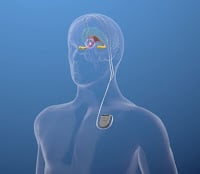
Will BRAVYL Reduce “Wandering” in Advanced Clinical Trials?
Woolsey Pharmaceuticals on Feb. 18, 2021 announced the launch of a Phase 2 CNS study of a medication intended to reduce wandering in dementia patients.

Woolsey Pharmaceuticals on Feb. 18, 2021 announced the launch of a Phase 2 CNS study of a medication intended to reduce wandering in dementia patients.
Please enter your request in the comments box below.

Get your message out with Alzheimer’s Weekly! Publish your news prominently on AlzheimersWeekly.com and email it to 30,000 opt-in subscribers. The fee is just $100.

VIDEO + ARTICLE: Scientists are applying an FDA-approved technique, Deep Brain Stimulation, to treat mild Alzheimer’s for 150 patients in Phase-3 clinical trials. Learn more.

Scientists have discovered a specific Alzheimer’s gene appears to drive the first appearance of amyloid plaque in the brain. Now they’re working on therapies targeting

Researchers are working on a new tool that can be used in primary care settings to scan electronic health records for missed dementia cases, to

PROGRESS – VIDEO & ARTICLE: A handful of Alzheimer’s patients signed up for a bold experiment: They let scientists beam sound waves into the brain

TREATMENTS: An important study shows how hormones may slow cognitive decline in postmenopausal women, as well as fight MCI (also known as “Pre-Dementia”).

Mefenamic Acid, a commonly used anti-inflammatory drug, successfully treated Alzheimer’s in the lab. The University of Manchester showed how this medication completely reversed memory loss

Researchers at the National Eye Institute say two new studies show diet plays a major role in slowing cognitive decline – and adherence to the

Don Hayen is a retired doctor, diagnosed with Alzheimer’s at 71. But that diagnosis took way too long. Find out how his “cognitive reserve” fooled his doctors. See why he sure wished it hadn’t.

There is more to us than our brains and our bodies, says dementia expert Teepa Snow. “There’s more to us than that … When we’re together, we become more.” Watch now.

Berkeley researchers reveal deep sleep might protect memory—even in the face of Alzheimer’s. Could your nightly rest be the brain’s best defense?

SHORT-TERM MEMORY lapses are obvious signs of Alzheimer’s, but other tell-tale signals begin to show much earlier. Learn how to look for semantic impairments, such as simple questions about size.

Three important dementia studies focus on HS-AGING, a type of dementia almost as common as Alzheimer’s in the 85+ group. Yet few people have heard of it. Why? What makes it different?

An intriguing study of 120 grandmothers might surprise you. Doctors know socially engaged people have better cognition and less dementia. But can a person get too much of a good thing? What’s the right balance?

Enjoy this great duet between a musician with dementia and his son. A triumph of spirit over Alzheimer’s! Sing-a-long if you like!
No spam, only news and updates.